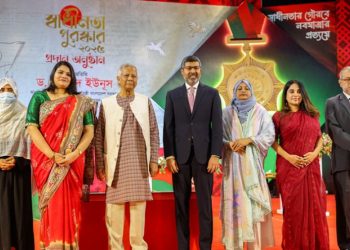Online Desk
Bangladesh has the lowest proportion of youths aged between 15 and 24 without secondary education level skills in South Asia, found a recent study.
Secondary education level skills represent traditional reading and maths skills typically associated with in-school learning.
About 58 percent of the youths in Bangladesh do not have such skills, according to the World Skills Clock.
The World Skills Clock is a collaboration between Unicef, the Education Commission, GenU and World Data Lab. It is an interactive web tool to visualise the scale of the global learning and skills crisis now and in the future.
Unicef and the Education Commission launched the clock alongside the unveiling of a new report published ahead of World Youth Skills Day today.
As many as 93.3 percent of the youths in Afghanistan are without secondary education level skills, followed by Bhutan (89 percent), Pakistan (84.5 percent), Nepal (81.7 percent), India (73 percent) and Sri Lanka (61.5 percent).
However, Bangladeshi youths aged between 15-24 lag behind Bhutan, India and Sri Lanka in digital skills.
Digital skills refer to the ability to use and understand technology and is measured by the proportion of youth who can perform basic computer-related activities, including copying or moving a file or folder, using copy and paste tools to duplicate or move information within a document, sending e-mails with attached files and transferring files between a computer and other devices.
About 85 percent of the youths in Bangladesh do not have digital skills.
Only Afghanistan (99 percent), Nepal (87.4 percent) and Pakistan (90.2 percent) in South Asia have a higher proportion of youths without digital skills.
Meanwhile, nearly three-quarters of the youths in 92 countries, including Bangladesh, are off-track to acquiring the skills needed for employment, according to the report “Recovering learning: Are children and youth on track in skills development?”.
High rates of out-of-school young people and low attainment of secondary-level skills are to blame, the report.
As a result, countries around the world are facing a skills crisis.
“An inspired, skilled generation of children and young people is critical for prosperity, progression, and the success of societies and economies. Yet, the majority of children and young people across the world have been failed by their education systems, leaving them uneducated, uninspired, and unskilled — the perfect storm for unproductivity,” said Robert Jenkins, Unicef’s director of education.
Investment in cost-effective, proven solutions to fast-track learning and skills development for today’s generation and future generations is urgently needed to address this crisis, he added.
To give young people the best chance to succeed and recover learning losses due to the pandemic, holistic support is needed, said Liesbet Steer, executive director of the Education Commission, a global initiative encouraging greater progress on Sustainable Development Goal 4: ensuring inclusive and quality education and promoting lifelong learning for all.
“But we can’t recover what we don’t measure. We need to know where children and youth are in building the range of skills they need and monitor their progress.”
Subsequently, the Education Commission, Unicef and partners are working to address critical data gaps. And the World Skills Clock is part of the initiative, Steer said.
It will help track progress on and raise awareness around youth skills attainment around the world such that urgent action can be taken to prepare this generation to thrive in the future, Steer added.


















Discussion about this post